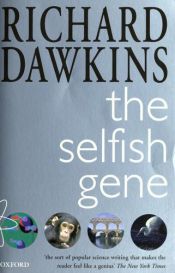The Selfish Gene
Blurb
The Selfish Gene adalah buku mengenai evolusi karya Richard Dawkins. Buku ini dibuat berdasarkan teori George C. Williams dalam bukunya Adaptation and Natural Selection.Dawkins menggunakan istilah "gen egois" sebagai cara untuk mengekspresikan pandangan evolusi berpusat-pada-gen yang menentang pandangan yang terfokus pada organisme dan kelompok, mempopulerkan ide-ide yang dikembangkan pada 1960-an oleh WD Hamilton dan lain-lain. Dari pandangan berpusat-gen, makin terkait secara genetis dua individu, makin masuk akal bahwa mereka berperilaku kurang egois satu sama lain. Oleh karena itu konsep ini sangat baik untuk menjelaskan banyak bentuk altruisme. Istilah ini tidak boleh dirancukan dengan istilah gen keegoisan.
Dalam bukunya, ia menjelaskan:
Suatu organisme ini diharapkan untuk berevolusi memaksimalkan kesesuaian yang inklusif--jumlah salinan gen yang diwariskan secara global. Akibatnya, populasi akan cenderung ke arah strategi evolusi yang stabil. Buku ini juga mengenalkan istilah "meme" untuk unit evolusi budaya manusia sebagai analogi untuk gen, menunjukkan bahwa replikasi "egois" demikian juga dapat memodelkan budaya manusia, dalam arti yang berbeda.

 English
English Español
Español Deutsch
Deutsch










Member Reviews Write your own review
Box304
This book is well written and makes a lot of good arguments and scenarios. I do like the author and wanted to make that point before starting. However, this book falls short in many regards. The main problem is that arguments based off of fictitious numbers will always support he who made the argument in the first place (since he chose these fictitious numbers). Ultimately, these arguments are extremely poor unless one elaborates extensively on why the numbers were chosen (which the author here does not). Another issue which I have is that author takes a few jabs at Christianity over the translation of a few words (which is another extremely poor argument). Here is the problem: take a look at the book entitle "The Case for Christ" by Lee Strobel. If one were to attempt to make an argument against Christianity, one should attempt to refute the types of claims Lee makes in this book. You see in order for an argument to be effective one must make that argument at the underlying base as a whole in order to qualify the whole entire argument as ineffective. Attacking an argument not at the base, but at the "fingertips" with trying to attack translations (which are widely accepted as accurate) is an extremely poor argument. For instance, if I were to attack evolution (as being an origin of life theory), I would simply state that "Evolution" does not provide a rationality for how matter came into existence. This would be an argument at the base as to why "Evolution" (as an origin of life theory), is not a good theory at all (because at it's core does not explain anything at all or offer up any sort of explanation as to where matter came from). If I were to attack Islam, I would make remarks such as 1) Muhammad changed text in what was the Bible (which Revelations says not to do) 2) Muhammad claimed to be greater than Christ, who claimed to be equal with God 3) Muhammad led Holy Wars for personal gain (an attack on the prophets Character) 4) Muhammad married a wealthy widow (here seeking only personal gain) 5) Muhammad married many women (here seeking personal pleasure over the Lord) 6) Christ's followers claimed Christ resurrected from the dead, and Muhammad is still dead There are other arguments which can be made, I'm just making the point that these arguments are at the base of what the religion/theory is teaching, and that is how an effective argument is formed.
Be the first person to review
Shiitake
An important book on understanding altruism and how evolution could explain the continuing survival of altruism in the survival game.
Be the first person to review